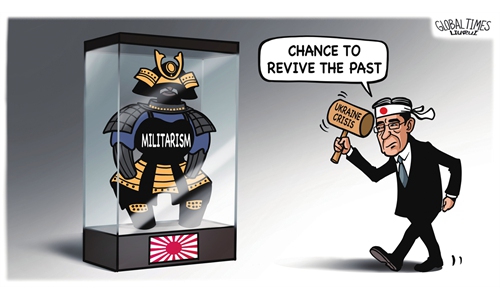
Fumio Kishida. Photo: CFP
Japanese Prime Minister Fumio Kishida on Sunday vowed to push for the Liberal Democratic Party (LDP)'s goal of revising the country's "Peace Constitution" at the party's convention. This move has surprised some observers. Why is Kishida, viewed as a dove, keen to amend the Constitution as Shinzo Abe was? Does it mean that Japan's policy has undergone major changes?
It should be noticed that to judge Japanese politicians, their words and deeds are key indicators, rather than what they are labeled. It cannot be concluded that Kishida tends to be soft on agendas like revising the Constitution and security as he has been labeled as a dove.
Japan's Constitution is regarded as a "rigid constitution," whose amendment must be approved by two-thirds of both houses of parliament and a majority in a public referendum. Any change in the Constitution is not an easy matter. Although the so-called Constitutional reform camp, including the LDP, Komeito, and Nippon Ishin, has occupied over two-thirds seats in the lower house, their seat in the upper house has not reached two-thirds. Even if their seats in both houses reached the required number, it does not mean they can smoothly push the amendment. This is because their propositions are widely divergent.
Furthermore, even if the National Diet passes their proposition to amend the Constitution, it remains difficult to predict whether they can get the majority's approval in a public referendum. In general, it is not possible for Japan to amend its Constitution in the near future.
With little hope, why does Kishida advocate constitutional amendment? It can be summarized as follows: First, it is to serve Japan's 2022 upper house election, which is scheduled in July. From Kishida's perspective, this summer's upper house election is the only hurdle to achieving his full three-year term as LDP president as well as prime minister. His performance in the House of Councillors election is critical to his future political administration, and a revision of the Constitution, the demand of LDP's core supporters, is to please voters.
The second is to maintain the relationship with Abe, which is very delicate right now. Kishida wants to go his own way, while Abe wants him to continue the "Abe line" and is quite wary of Kishida's possible moves. Abe is quite lukewarm to Kishida's "new capitalism" and other ideas, but is satisfied with his advocacy of revising the Constitution. Thus, Kishida is actually selling favors to Abe and maintaining the relationship with the former prime minister.
The third is to keep the revision of the Constitution in the limelight to gradually influence the public. Both Abe and Kishida understand the relatively small possibility of revising the Constitution at the moment. The purpose for them to make a lot of noise in this regard is to educate the public and increase people's support for revising the Constitution, so as to make up for the shortcomings of the future referendum.
It's actually of great significance for Japan to revise the Constitution. Some people disagree with it by arguing that Japan has already hollowed out Article 9 of the Constitution by reinterpreting the Constitution and other means. This is reasonable to some extent because, after decades of accumulation under the so-called exclusively defense-oriented policy, Japan can have almost every kind of weapon, except those particularly listed by the Japanese government, including intercontinental ballistic missiles, so-called attack aircraft carriers or long-range strategic bombers. The role of Article 9 of the Constitution in limiting Japan's "rearmament" is almost negligible.
But if we look at the Constitution, especially Article 9, from a higher level, we can learn that the Constitution itself is a symbol of Japan's unconditional surrender and the post-war order, making Article 9 a thorn in the right-wing's side. In recent years, the Japanese government and right-wing politicians have repeatedly proclaimed that they are "followers of rules-based international order," accusing China of "trying to change the status quo."
In this Russia-Ukraine conflict, Abe said that Russia's move is "a serious challenge to the international order," intending to replace the logic of "post-war international order" with the logic of the so-called liberal democratic order. In this regard, all parties must remain on high alert.
The author is an associate research fellow on Japanese studies at the China Institutes of Contemporary International Relations. opinion@globaltimes.com.cn

